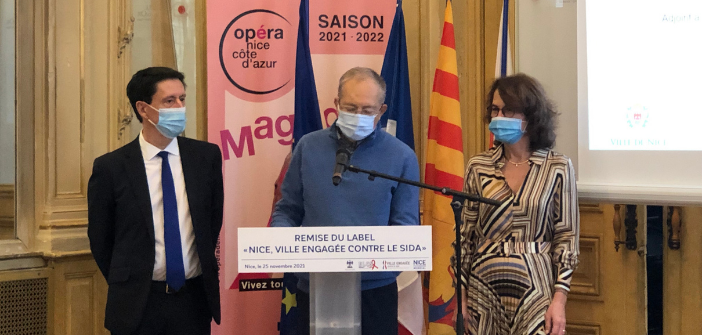For the second time, the city of Nice has been awarded the label “City Committed Against AIDS,” recognizing cities whose efforts to combat the AIDS epidemic are exemplary. Nice had previously received this label in 2018. The award ceremony also provided an opportunity to discuss topics such as aging well with HIV and HIV during the Covid pandemic.
Nice, “City Committed Against AIDS”
This label, “City Committed Against AIDS,” is well-earned by Nice, as the city has implemented numerous initiatives to combat HIV. Since 2016, Nice has been a member of the Association of Local Officials Against AIDS, founded and presided over by Jean-Louis Romero-Michel.
The city of Nice is also committed to Corevih PACA Est, an association that covers the Alpes-Maritimes department and part of the Var department, and is involved in its project “Objective: Zero AIDS.”
This “Objective: Zero AIDS” project has been transformed with the “at the lab without prescription” operation, which aims to facilitate HIV testing in laboratories without a prescription, appointment, or cost. Launched on July 1, 2019, in Paris and Nice, this experiment has been, according to Erwann le Hô, vice-president of Corevih PACA Est, “a successful gamble.”
In fact, in Nice, 700 to 800 “at the lab without prescription” screenings have been conducted each month since the project’s inception, accounting for 7.2% of laboratory HIV tests. He also noted that this 7.2% represents an additional volume, primarily consisting of heterosexual men who previously did not get tested at all before this project.
The major success of this project is that it will be rolled out across France starting January 1, 2022, and will be included in the social security funding plan for 2022. This means that everyone in France will have access to free, prescription-free HIV testing in all departments and laboratories.
[Award ceremony image caption: Award ceremony for the “City Committed Against AIDS” label to the city of Nice, represented here by Deputy Mayor Richard Chemla (in blue on the right) and in the presence of Jean-Louis Romero-Michel (in black in the center). Nice Opera, November 25, 2021.]
AIDS During the Covid Period
Dr. Richard Chemla, Deputy Mayor of Nice responsible for health, ecology, and well-being, described AIDS as a “silent epidemic,” compared to that of Covid-19.
Also present at the award ceremony, Jean-Louis Romero added, “AIDS is still here, but nobody talks about it. Covid has erased everything, although it is possible to work on two pandemics at the same time.” He also reminded that every day, 2,000 people die from HIV worldwide and that to prevent any more deaths, we would need “only” 28 billion dollars.
He emphasized the importance of politics in the fight against the disease and stressed that awareness is crucial, particularly regarding testing and practices such as chemsex (short for chemical sex: sexual intercourse under the influence of drugs), which promote the transmission of HIV.
“AIDS is also treated through politics. We need to mobilize, we need to remind people that simultaneous work on two pandemics is possible,” he continued.
Dr. Chirio, a hospital practitioner at CHU Nice, infectious disease specialist, and member of Corevih PACA Est, added that during March and April 2020—during the first lockdown—the distribution of PrEP treatments (given to HIV-negative individuals at high risk) decreased by 28%. Meanwhile, HIV serologies (screening tests) decreased by 16% during the same period.
Aging Well with HIV
Regarding the aging of HIV-positive individuals, Dr. Richard Chemla stressed the importance of developing training for staff in nursing homes to better care for these HIV-positive individuals who now have a life expectancy equal to those who are HIV-negative.
Pascale Bastiani, HIV-positive since 1983-85, warned that vigilance is needed against serophobia in nursing homes, but also in retirement homes or social services centers, where homosexual, transgender, or drug-addicted individuals could face discrimination.
In short, although there is still significant progress needed to achieve the goal of ending AIDS by 2030—which would require 90% of people to get tested, 90% of HIV-positive individuals to receive treatment, and 90% of these people to have no viral load—Nice remains a city particularly committed to the fight against AIDS.


